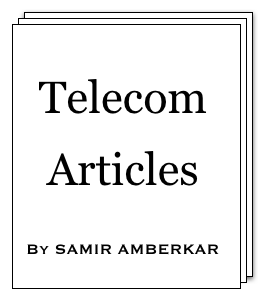Transaction portion [Under SS7 >> TCAP]
Transaction portion helps in identifying the transactions (and which would probably map to TCAP user who is involved in the transaction). Transaction Identifier is an important parameter here. There will be two transaction IDs here: originating and destination, assigned by respective nodes.
Transaction portion contain a message type which tells about the type of transaction message being sent. Possible values are:
UNIDIRECTIONAL: Message is being sent in one direction only and does not require response (return) message
BEGIN: This is used to initiate a transaction, but destination point may end the transaction.
END: This ends the transaction. It is normally final reply to BEGIN.
CONTINUE: When the transaction need to be continued, CONTINUE is used. Destination point, after receiving BEGIN, would send back this portion to let Originating point know that the transaction can be continued.
ABORT: This to terminate transaction due to abnormal situation. P-abort signifies that the transaction is aborted by protocol errors (like invalid values/tags etc.). U-abort is due to abort by TCAP user.
Component portion [Under SS7 >> TCAP]
With Transaction portion, TCAP provide a framework for multiple transactions. With component portion, TCAP provide flexibility of having multiple operations under one transaction. Component portion contain information related to component, relation of a component with earlier components, and the actual operation information.
Types of a component are; INVOKE (last/not last), RETURN RESULT (last/not last), RETURN ERROR, and REJECT.
INVOKE component, as the name suggests, invokes an operation. Last/Not last signifies if there are any further components.
RETURN result is used to return the results of an Invoke.
REJECT is protocol error, TCAP not able to process it possibly. Examples may be length not correct, invalid values etc.
RETURN ERROR is an operational error like unavailable resource, unauthorised request etc.
Note that Return result may itself contain an error happened at TCAP user level.
Correlation ID is used to correlate the component to earlier received components.
In addition, component portion contain operation codes and the parameters related to operation. Operation codes and parameters are implementation specific, but may still be standardised (like MAP/GSM)
Dialog portion [Under SS7 >> TCAP]
Dialog portion is an optional component. This contain an additional information like protocol version, encryption (security context), application that is to be addressed (application context) etc. Dialog could be structured dialog or unstructured one. Unstructured dialog is basically a one time transmission with no expectation for response from received. In structured dialog, dialog portion would contain DIALOG BEGIN (X.227-AARQ), DIALOG CONFIRM (X.227-AARE), or DIALOG ABORT (X.227-ABRT).
A popular user of Dialog portion is MAP/GSM. In MAP, application context name is used; it will have information about MAP module and version. Using this, appropriate software module can be chosen to process the transaction.
Example of TCAP portions [Under SS7 >> TCAP]
Let us say, entity A would like to begin transaction with entity B - TCAP message may contain BEGIN transaction portion, (optional) DIALOG BEGIN/AARQ dialog component, and INVOKE component.
B may reply back with CONTINUE, AARE, and RETURN !
Primitives [Under SS7 >> TCAP]
Dialog handling primitives are:
TC-NOTICE (Ind/Req)
TC-UNI (Ind/Req)
TC-BEGIN
(Ind/Req)
TC-CONTINUE (Ind/Req)
TC-END
(Ind/Req)
TC-U-ABORT (Ind/Req)
TC-P-ABORT (Ind)
Component handling primitives are:
TC-INVOKE (Ind/Req)
TC-RESULT-L (Ind/Req)
TC-RESULT-NL
(Ind/Req)
TC-U-ERROR (Ind/Req)
TC-L-CANCEL
(Ind)
TC-U-CANCEL (Ind)
TC-R-REJECT (Ind)
TC-L-REJECT
(Ind)
TC-U-REJECT (Ind/Req)
In next article, we will continue with ISUP.
References: Q.700 (SS7), Q.771 (Functions of TCAP), Q.772 (Information elements of TCAP), Q.773 (TCAP message formats), Q.774 (TCAP procedures), X.690 (ASN.1), X.227 (OSI protocol), SS7 book by Russell, GSM Networks book by Heine.
© Copyright Samir Amberkar 2010
| TCAP - 1 « | SS7 Index | » ISUP - 1 |



